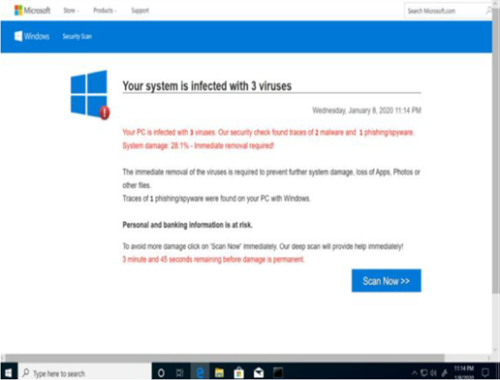Two tech support companies will pay $26 million to settle Federal Trade Commission charges that they bilked tens of millions of dollars from consumers, particularly older consumers, by duping them into buying computer repair services in violation of the FTC Act and the Telemarketing Sales Rule.
In a complaint filed in federal court, the FTC charged that Restoro Cyprus Limited and Reimage Cyprus Limited, both based in Cyprus, tricked consumers into signing up for computer repair services through deceptive marketing.
“These companies used scare tactics and lies about threats to consumers’ personal computers to bilk consumers, particularly older consumers, out of tens of millions of dollars,” said Samuel Levine, Director of the FTC’s Bureau of Consumer Protection. “We have taken decisive action to halt this scheme and return money to consumers.”
Consumers were lured or alarmed by fake Microsoft Windows pop-ups, which stated that the consumers’ computer or system was infected with viruses and urged consumers to “scan” their computers “To avoid more damage.” The FTC charges that, regardless of the actual health of the consumers’ computers, the companies’ scans typically identified purported serious issues that needed immediate attention.

Following the scans, the companies urged consumers to purchase its software online to “fix” the alleged problems or remove alleged viruses and malware, according to the complaint. The software’s cost typically ranged from $27 to $58.
After purchasing the software, consumers were provided a number to call to “activate” the software. Thereafter, Restoro and Reimage telemarketers attempted to sell additional services by accessing consumers’ computers and misrepresenting that routine computer errors and messages were signs of malware, viruses or other problems. The companies’ telemarketers routinely claimed that the “problems” on consumers’ computers could not be fixed with the newly purchased software alone and required help from a Restoro or Reimage technician, which cost hundreds of dollars more, according to the complaint.
Under the signed order, Restoro and Reimage are required to pay $26 million, which the FTC intends to use to provide redress to deceived consumers. The order also prohibits Restoro and Reimage from misrepresenting security or performance issues or any other material issues related to the sale, marketing or distribution of any product or service, and from engaging in deceptive telemarketing.
The Commission voted 3-0 to authorize the staff to file the complaint and stipulated final order.
The FTC filed the complaint and stipulated order in the U.S. District Court for the District of Columbia.
NOTE: The Commission files a complaint when it has “reason to believe” that the named defendants are violating or are about to violate the law and it appears to the Commission that a proceeding is in the public interest. Stipulated final orders have the force of law when approved and signed by the District Court judge.
The lead staffers on this matter are Russell Deitch, Sung W. Kim and Frances Kern in the FTC’s Bureau of Consumer Protection.
The Federal Trade Commission works to promote competition and protect and educate consumers. The FTC will never demand money, make threats, tell you to transfer money, or promise you a prize. Learn more about consumer topics at consumer.ftc.gov, or report fraud, scams, and bad business practices at ReportFraud.ftc.gov. Follow the FTC on social media, read consumer alerts and the business blog, and sign up to get the latest FTC news and alerts.
